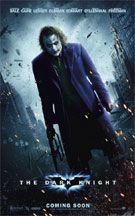The Dark Knight is unlike any superhero movie that has come before it, and that includes the stellar Batman Begins. While 2005's origin story was a breakthrough with its gothic visuals and harsh realistic tone, director Christopher Nolan's next entry in the series shatters what we've known as the walls of the superhero genre. An ensemble political thriller as much as it is a tale of revenge and derring-do, The Dark Knight is a wondrous, terrifying epic.
Even though he's virtually rid Gotham of crime, Batman (Christian Bale) is still an isolated figure, technically an outlaw, when the movie begins. Bat imitators litter the streets and do little more than get themselves into trouble, and Gothamites are taking a hard look at themselves, wondering what good a masked vigilante can really do. Bruce Wayne realizes what the city really needs is a hero with a face exposed to the world, fighting crime through law, not weapons.
That's where Harvey Dent (Aaron Eckhart) comes in, the district attorney literally referred to as "the white knight" as he relentlessly pursues mob bosses and other hoods. With Bruce's old flame Rachel (Maggie Gyllenhaal) on his arm, Dent teams up with Gordon and Batman himself to stop what remains of Gotham's organized crime; Bruce is even ready to hang up the cape and leave the law in charge, until the startling arrival of a cackling demon who calls himself the Joker.
Heath Ledger's Joker is the embodiment of all terror and rage, an evil force as illogical as a tornado, and fearless in the way only a sociopath can be. He sets his sights on Batman only because he wants the game of crime to be more fun, and wages a war of aimless chaos against Gotham while taunting Batman to reveal his face. The Joker demands that Gotham accept a life without rules, and as Dent, Gordon and Batman become increasingly desperate to stop him, they're each forced to break the rules they've lived by. The Dark Knight is peppered with lots of talk about dark vs. light, good vs. evil, freak vs. human-- familiar comic book stuff, and familiar stuff for Christopher Nolan too, he of Memento and The Prestige. Nolan believes so much in the real-world implications of Batman's story that what seems hokey in other movies feels desperately urgent here. There are lots and lots of speeches, with deeply intoned aphorisms about morality and truth, but they fit into Nolan's larger portrait of a city just barely teetering above chaos. As the Joker says near the end of the film, "Madness is like gravity—all it takes is a single push." Each of the main characters, the Joker included, are standing on a ledge.
With all the philosophy the action can often feel beside the point, but Dark Knight delivers on that front in a restrained, skillful way. Gone are the disorienting, over-edited fights of Batman Begins-- except for Batman's first scene, there's very little fisticuffs at all. Instead there are heists, chases, kidnappings and a few explosions, most of them filmed gloriously in IMAX and all of them pointing to a director in complete control of his film. There are very few opportunities for pleasure like you get in other superhero films, when the bad guy is dispatched with a punch and a witty quip; the fights leave marks, on Batman and on us, and even when the good guys win, Nolan isn't interested in savoring victory. This is, after all, the middle of a trilogy—the victory will come later, if it comes at all.
The incredibly detailed viral marketing that surrounded The Dark Knight, with its full issues of fake newspapers and TV news interviews, were hints at the grand, city-wide story Nolan wants to tell. He doesn't quite succeed with it, both because he never fully explores the situation of everyday Gothamites, and he loses track of some of the smaller characters amid the complex machine of the plot. Alfred (Michael Caine) and Lucius (Morgan Freeman) are particularly short-shrifted, even though new characters like the Mayor (Nestor Carbonell) are compelling in their limited capacity. Though it is much more than just a story about a caped crusader, The Dark Knight isn't quite the tale of civic despair it wants to be.
But still, none of those things matter while watching the movie, which breezes by even at two and a half hours. To make something so complex and relentlessly dark succeed as entertainment, the talent here has aligned in a rare and exceptional way. Ledger is as indelible and mesmerizing as any great villain in movie history, and Bale engages fully in their two-sided game of torment, a man haunted even before this terrible figure showed up to tell him he's a freak. Eckhart is surprisingly good too, in what amounts to two roles, and Oldman gives Gordon so much depth, he becomes a fourth lead character. On the technical side, Nolan is in perfect sync with his cinematographer Wally Pfister and editor Lee Smith, making the entire film as exhilarating and fluid as a flight on Batman's wings.
They say every era gets the kind of hero it deserves, and The Dark Knight is surely a superhero movie for our times, in which even the best of men can find themselves doing wrong. The hopeful exuberance of Spider-Man, made before 9/11, isn't bad in comparison; it just doesn't fit with where we are now. Nolan has shown a new way to tell a superhero story, and it may turn out to be the only way to tell a story about heroes in this troublingly amoral time. We may want our white knights, but it's the dark knight that we need.
Staff Writer at CinemaBlend
Most Popular





